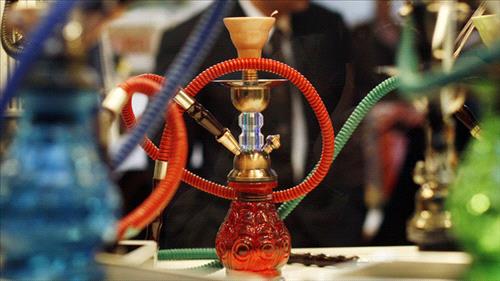Ammon News - AMMONNEWS - Religious obligations aside, the holy month of Ramadan marks a special time for connecting with loved ones. Naturally, restaurants and cafes waste no time introducing special offers to cash in on the surge in social activity.
However, one offering is causing us more harm than good. Health experts say one session of shisha – also known as hookah or hubbly bubbly – is equivalent to smoking up to five packets of cigarettes.
While cigarettes remain the most common form of tobacco worldwide, shisha has been fast rising in popularity since the 1990s, not only in the Middle East and North Africa but also in the United States and Europe. Consumption increases during Ramadan due to its widespread availability.
A large percentage of users are not aware of the dangers. A recent study by quitshisha.com showed that 44 percent of smokers thought that shisha was less harmful than smoking regular cigarettes. The World Health Organization (WHO) says the smoke inhaled in a typical one-hour shisha session can equal 100 cigarettes or more.
Global epidemic
Tobacco use is one of the biggest threats to public health the world has ever faced, killing up to half of its users. WHO estimates that smoking tobacco products kills 6 million people worldwide every year, with more than 5 million of those deaths the result of direct tobacco use. More than 600,000 deaths are said to be due to non-smokers being exposed to second-hand smoke.
If urgent action is not taken, WHO says the annual death toll could rise to more than 8 million by 2030.
Government health authorities in the United Arab Emirates (UAE) estimate that at least 27 people – 26 men and 1 woman – die each week due to tobacco use. The prevalence of smoking in Saudi Arabia is said to reach up to 52.3 percent of the population.
The Institute for Health Metrics and Evaluation at the University of Washington has previously reported that Saudi Arabia, Yemen and Oman were among the 10 countries with a population over 1 million that had the highest average daily cigarette consumption.
Dangers
There are a number of reasons why people smoke shisha, including using it as an alternative form of smoking, a substitute to smoking, or assuming that the fruity flavours makes it less harmful. However, the common assumption that it is less dangerous to health is not supported by any scientific data.
Most global studies that have looked into the effects of shisha smoking have found that a number of harmful compounds are present, including tar, carbon monoxide, aldehydes, and even radioactive substances and heavy metals.
A new report by Dr Wasim Maziak at the Syrian Center for Tobacco Studies found that the biggest health hazards associated with shisha smoking include carbon monoxide poisoning, lung cancer, prostate cancer and oesophageal cancer.
Call for action
Despite the fact that health warnings, and bans on advertisements and flavoring exist for cigarettes, many of these laws are yet to be applied to shisha.
“In the face of such a burgeoning epidemic, many countries continue to neglect water pipe smoking in their tobacco control policies,” said Dr Maziak. “Clean indoor air laws and tobacco taxation already exist in many societies, and bringing water pipe venues, products and retailers under these policies can be a major step in advancing water pipe control in these societies.”
So what are the best ways of quitting shisha or cigarettes?
Knowing you will save money: Shishas are drastically marked up during Ramadan, with prices reaching AED 100 ($27) to AED 150 ($41). If one shisha session costs $27, and you go out two weeks of the whole month, you will have burned away $378.
Nicotine Replacement Therapy (NRT): Consisting of products such as skin patches, inhalers and lozenges, NRT is designed to help smokers get over initial cravings. According to a recent report in the Australian Journal of Pharmacy, NRT can increase the chances of a smoker quitting by 60 percent in comparison to unassisted attempts.
Switching to less harmful products: With most experts agreeing that nicotine is not the primary cause of smoking-related diseases, a growing number of companies are looking at developing less harmful alternatives. This is known as tobacco harm reduction.
E-cigarettes: The latest edition of the Global Forum on Nicotine saw the majority of scientists and medical practitioners speak in favor of e-cigarettes, commonly known as vaping. Dr Konstantinos Farsalinos, a Greek cardiologist who has been working on e-cigarette research since 2012, revealed during the event that out of the 19,441 e-cigarette users he has studied, 81 percent had quit smoking completely since taking up vaping instead.
While it has been scientifically proven that e-cigarettes contain significantly fewer toxins than shisha or cigarettes, they are currently banned in Lebanon, Oman, Saudi Arabia and the UAE. However, health authorities – particularly those in the Gulf Cooperation Council – are reportedly looking at reviewing this ban in the near future.
*Al Arabiya








 comment replay
comment replay 